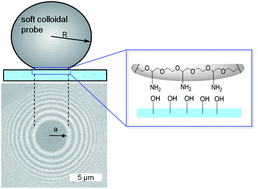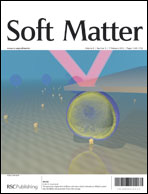Synthesis and functionalization of poly(ethylene glycol) microparticles as soft colloidal probes for adhesion energy measurements†
Abstract
We report on the synthesis and operation of new soft colloidal probes (SCPs) as sensors for adhesion energy measurements. The measurements involve determination of the thermodynamic work of adhesion using the Johnson–Kendall–Roberts (JKR) approach. To maximize the sensitivity as well as the specificity of adhesion measurements in aqueous media we use highly compliant poly(ethylene glycol) (PEG) microparticles as SCPs. The chemical inertness of PEG offers advantages as probe material, but at the same time complicates the integration of functional groups. Consequently, we focus on the development of a straightforward yet variable surface modification procedure involving radical surface chemistry using


 Please wait while we load your content...
Please wait while we load your content...